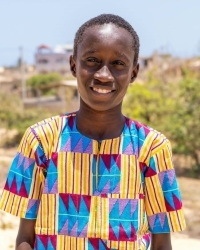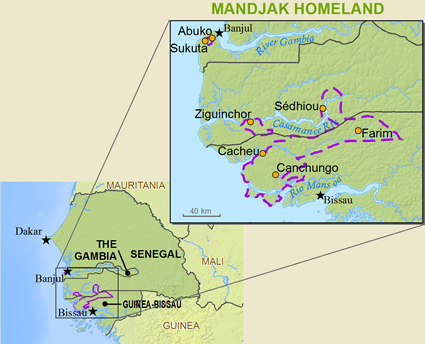The Mandya, Manjaco in West Africa are best known as the Mandyak people. Their name means, "I tell you."
They mainly live in northwestern Guinea-Bissau, though others live in southern Senegal or The Gambia. Some have migrated to France, a country that once held their homeland as a colony.
They are a rural people who make their living by subsistence farming like most people in their part of West Africa.
The Mandyak people hold to traditional religion that centers around the spirits of their ancestors. They believe these ancestral spirits are selfish and vindictive, yet they have power to bring good or bad fortune. During their many rituals Mandyak have been known to demand that the ancestral spirits do them favors in return for the gifts and offerings they bring. They sometimes refer to these spirits as "workers" and the Mandyak are the "employers" who will only pay them with offerings if the spirits produce blessings.
The Mandyak people believe that funerals are essential to ensure that these spirits treat them well. Mandyak who move to cities will return to their rural homelands to participate in funeral rituals.
Some are Christian, usually Roman Catholic. There is a higher percentage of Mandyak Catholics in France.
The JESUS Film is available in their language. Someone needs to go throughout their homeland and show them this film about the life of Jesus Christ. Then they will have the chance to choose the Lord of lords or their capricious ancestral spirits. Fortunately, there are some Christ followers among the Mandyak people in The Gambia.
Pray for a team of people to show the JESUS Film in Mandyak villages.
Pray for the Mandyak people to put their faith in Jesus Christ rather than fallen, wicked spirits.
Pray for a disciple-making movement among the Mandyak people.
Scripture Prayers for the Mandyak, Manjago in Gambia.
https://en.wikipedia.org/wiki/Manjack_people
http://www.livedead.org/2015/06/12/upg-the-mandyak-manjaco-of-guinea-bissau/
https://culanth.org/articles/175-the-funeral-and-modernity-in-manjaco
| Profile Source: Joshua Project |












